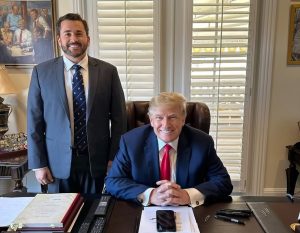Malaysia’s government is facing growing pressure to reject a right-wing author and social media influencer picked by President Donald Trump to be the next U.S. ambassador to the country.
Donald Trump announced last week that Nick Adams, a right-wing influencer and self-proclaimed “alpha male,” had been nominated to fill the vacant post in Kuala Lumpur, praising him as an “incredible patriot and very successful entrepreneur, whose love of, and devotion to, our Great Country is an inspiration.”
Earlier this week, the youth wing of Prime Minister Anwar Ibrahim’s People’s Justice Party (PKR) announced plans to submit a memorandum of protest to the U.S. embassy in Kuala Lumpur about Adams’ proposed appointment. Arief Izuadin of the PKR’s Youth International Relations Bureau said that any rejection “should not be misconstrued as hostility but rather seen as a necessary measure to safeguard the integrity of bilateral relations and ensure that diplomatic envoys can contribute constructively, in a manner aligned with the shared aspirations of both nations.”
The Australian-born Adams, 40, who became a U.S. citizen in 2021, is mostly known for his cartoonish persona on social media, where he has professed “a love for hot dogs, steak, muscle cars, and restaurant chain Hooters, where servers wear revealing uniforms,” as Reuters drily explained. In his posts on X, Adams brags that he reads the Bible regularly, is “wildly successful” and “extremely charismatic,” and has been “pursued by copious amounts of women.” His profile banner on X describes him as “President Trump’s favorite author.”
However, it is perhaps Adams’ comments about Israel and Islam that have provoked the most concern in Malaysia, where sympathy for the Palestinian cause is widespread. Last year, Adams wrote on X, “If you don’t stand with Israel, you stand with terrorists!” and his feed contains frequent critical comments about Islam. Back in 2013, he posted on X (then Twitter) that “we are at war” with Islam and “always will be.”
In a post on X following his nomination, Adams thanked Trump, saying that it was “nothing short of a lifetime’s honour to take the president’s goodwill and spread it to the great people of Malaysia.” He then adopted a diplomatic tone, telling Malaysians that he could not wait “to experience your noble culture and learn much from you.”
But former government ministers and political figures from across the Malaysian political spectrum have expressed strong reservations about Adams’ nomination, citing his outré social media persona and his comments about Islam and Israel.
Former Law Minister Zaid Ibrahim said this week that Malaysia “should not be treated as a dumping ground for ideological firebrands and partisan influencers,” according to The Guardian. Adams’ nomination “would not be a gesture of goodwill – it would be an insult,” he added.
Former Health Minister Khairy Jamaluddin, who has described Adams as a “Zionist turd,” added that Malaysia had every right to reject his appointment, citing Article 4 of the Vienna Convention on Diplomatic Relations, which stipulates that a receiving state may refuse any diplomatic envoy without having to provide any justification.
Mohamed Sukri Omar, a youth leader of the Islamic opposition party PAS, said in a statement that the appointment would be “an open insult towards the sensitivities of the Malaysian people.”
Even members of Anwar’s Pakatan Harapan (PH) coalition have joined the chorus of concern. Kasthuri Patto of the liberal Democratic Action Party wrote in an opinion article that Malaysia “deserves better than Adams as an ambassador of the U.S.,” while a youth leader from Amanah said that Adams’s rhetoric on social media “is full of hatred, racism and Islamophobic sentiments, clearly deviating from the spirit of mature bilateral relations.”
It is only natural for Malaysians to see the appointment of such an undiplomatic figure either as a purposeful insult or reflecting an equally insulting disregard for Malaysian sensitivities – and its status as a nation with which the U.S. has generally enjoyed good relations. In comments to The Guardian, Bridget Welsh said that the appointment displayed “no real recognition and deep appreciation about how critical a role Malaysia plays in the U.S. economy, and the critical importance of these ties for issues of security.”
The breadth of the opposition to Adams’ nomination has created an acute political dilemma for Anwar, already under pressure for failing to broker a tariff deal with the U.S. and for alleged executive interference in the judiciary.
If Anwar’s government were to take the highly unusual step of rejecting Adams’ nomination, such action would be unlikely to go down well with Trump, as veteran Malaysian diplomat Dennis Ignatius told Malaysia Now. “Rejecting a nomination – and one from Trump, in particular – is a serious matter and could lead to a rupture in bilateral relations,” he said.
This would no doubt also complicate Malaysia’s position in its ongoing tariff talks with the U.S., through which it is hoping to reduce the 24 percent “reciprocal tariff” announced by Trump in April, which was subsequently raised to 25 percent by Trump this month.
As a result, Ignatius said that Malaysia might therefore be forced “to swallow our pride and accept Adams’ ill-considered nomination.” He added, “If Adams is as close to Trump as it is made out to be, he might serve a useful purpose as a conduit to the White House. God knows, we need all the friends we can get in Trump’s America.”
Conversely, accepting Adams’ credentials in the face of such broad opposition could create domestic political complications for Anwar, gifting conservative Islamic forces like PAS a stick with which to beat his administration. As Shahriman Lockman of Malaysia’s Institute of Strategic and International Studies told Reuters, “There’s no elegant solution here. It’s damned if you do, damned if you don’t.”

































